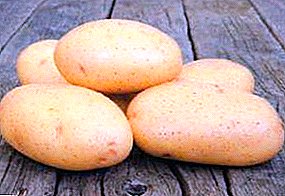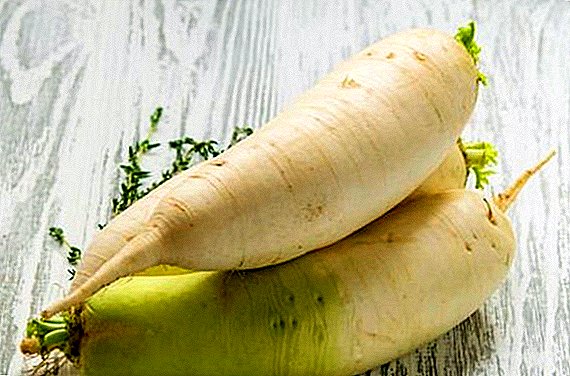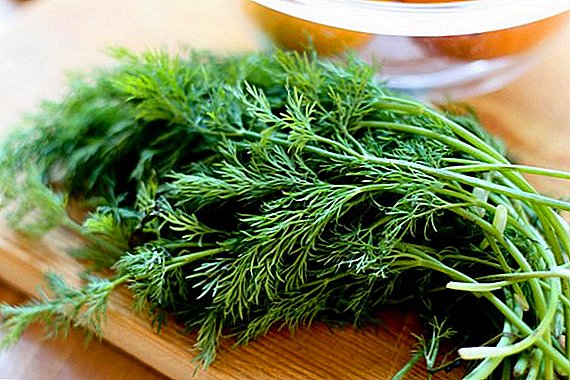 Green is familiar to each of us dill, charming with its aroma. It is one of the most popular elements of decorating dishes and giving them flavor. However, few people know that this uncomplicated plant also has amazing healing properties. In this article we will look at how dill is useful for the human body and what are the contraindications to its use.
Green is familiar to each of us dill, charming with its aroma. It is one of the most popular elements of decorating dishes and giving them flavor. However, few people know that this uncomplicated plant also has amazing healing properties. In this article we will look at how dill is useful for the human body and what are the contraindications to its use.
Composition and calorie dill
Dill - annual plant that can be found on each garden plot. Unpretentious care, gives a good harvest. The composition of dill determines its benefits and harm to human health. Dill is a very valuable source of useful elements and vitamins.
Green plants contain such useful components:
- carotene;
- thiamine;
- riboflavin;
- calcium;
- potassium;
- phosphorus;
- iron;
- flavonoids;
- carbohydrates
- pectin.
In addition, dill contains valuable organic acids:
- folic;
- oleic;
- palmitic;
- linoleic;
- petrozelinovaya.
Vitamin composition of the plant includes the following groups:
- BUT;
- beta carotene;
- AT;
- WITH;
- E;
- PP
 All parts of dill are rich in essential oil, which gives it such a heady aroma. All components of dill are essential elements for the normal functioning of the human body. Despite such a rich composition, dill is a low-calorie diet product. 100 g of the product contains 40 kcal. The nutritional value of dill is:
All parts of dill are rich in essential oil, which gives it such a heady aroma. All components of dill are essential elements for the normal functioning of the human body. Despite such a rich composition, dill is a low-calorie diet product. 100 g of the product contains 40 kcal. The nutritional value of dill is:
- water - 85.5 g;
- carbohydrates - 6.3 g;
- ash - 2.3 g;
- proteins - 2.5 g;
- dietary fiber - 2.8 g;
- fat - 0.5 g
Did you know? Carbohydrates, which are contained in dill, are easily digestible. Therefore, they are not delayed and quickly burned in the process of life. The product per 100 g contains only 0.1 g of saturated fatty acids.
Useful properties of dill for the human body
On the question of whether dill is useful, without a doubt, you can answer - it is useful and even very. The plant contains a rich complex of vitamins and nutrients. Because of this, it has such useful characteristics:
- strengthens the immune system;
- promotes wound healing;
- has expectorant properties;
- helps to improve digestion;
- reduces pressure;
- strengthens the muscles of the heart;
- diuretic;
- choleretic;
- soothing;
- relieves headaches;
- helps with insomnia;
- improves appetite;
- stimulates the release of milk during lactation;
- stimulates the secretion of digestive secretions;
- soothes intestinal and stomach cramps;
- thanks to beta-carotene improves vision.
 Due to the low-calorie content and the simultaneous content of a large number of elements necessary for the body, dill must be present in the diet of people who follow the diet. In addition, the plant is an effective antioxidant and helps to eliminate toxins from the human body. This has a beneficial effect on liver function.
Due to the low-calorie content and the simultaneous content of a large number of elements necessary for the body, dill must be present in the diet of people who follow the diet. In addition, the plant is an effective antioxidant and helps to eliminate toxins from the human body. This has a beneficial effect on liver function.
The benefit of dill for the stomach can not be overemphasized. It helps to improve digestion, the secretion of digestive secretions, has a calming effect on stomach cramps. That is why it has long been recommended for small children and pregnant women to take dill tea with colic and swelling.
Important! Dill has a strong diuretic and choleretic properties. Therefore, if you have large stones in your kidney, gall, or urine, dill is not recommended. The plant can provoke the movement of stones and blockage of the choleretic and diuretic ducts, which is life threatening.
What is useful dill for women
 Consider the effect of dill and its beneficial properties and contraindications for women. Dill contains flavonoids, as well as vitamins of group B, which contribute to the normalization of the menstrual cycle, facilitate painful sensations during menstrual syndrome. Due to the content of calcium and phosphorus, the product strengthens hair and nails.
Consider the effect of dill and its beneficial properties and contraindications for women. Dill contains flavonoids, as well as vitamins of group B, which contribute to the normalization of the menstrual cycle, facilitate painful sensations during menstrual syndrome. Due to the content of calcium and phosphorus, the product strengthens hair and nails.
The plant is very useful for pregnant women. It contains folic acid and iron, which are necessary for the normal development of the fetus. Due to its calcium content, dill helps to relieve muscle cramps, which often worry future moms because of the lack of this element.
The plant is useful for nursing women, because it helps to improve the secretion of milk from the mammary glands. Dill improves digestion and soothes stomachic, intestinal colic. Helps with constipation and bloating. It is also very important for pregnant women, because during this period there is a restructuring of the body and the digestive processes are often disturbed. And, of course, thanks to vitamin C, the product helps to strengthen female immunity, which is simply necessary during pregnancy and lactation.
Dill is contraindicated for use in hypertension, as well as heavy bleeding during menstruation, as the bleeding may increase. Despite the rich content of nutrients, during pregnancy a lot of product should not be consumed, so as not to cause uterine contraction.
Important! Some pregnant women may be allergic to beta-carotene, which is contained in dill. If signs of allergy are detected, discontinue use of the product.
Useful properties of dill for men
 Separate attention is deserved by influence dill and its advantage and harm for men. Since ancient times, dill is used to restore potency, enhance sexual desire. Also, the plant helps to get rid of prostatitis. Dill has soothing properties. that will help a man to relieve stress from the problems of everyday days.
Separate attention is deserved by influence dill and its advantage and harm for men. Since ancient times, dill is used to restore potency, enhance sexual desire. Also, the plant helps to get rid of prostatitis. Dill has soothing properties. that will help a man to relieve stress from the problems of everyday days.
At the same time, excessive use of the product is harmful to the body, leading to drowsiness, visual impairment and intestinal work. Dill hypotonics is contraindicated.
How is dill used in modern medicine
In modern medicine, dill is used in various forms:
- fresh as an additive to food;
- dried grass;
- dried seeds;
- infusions;
- decoctions;
- Dill water.
In each pharmacy you can find dried grass or fennel seeds. They are used for the preparation of decoctions, dill water, which soothe colic, contribute to the flow of bile, are an effective cough medicine.
 Also on sale is already prepared dill water, which can be given to a child from two weeks to soothe colic. This is well handled and packaged dill tea. Dill is part of many drugs that are used for disorders of the gastrointestinal tract, kidney disease, urea, gallstone disease, sleep disorders, neuritis, depression. The most popular drugs based on dill include:
Also on sale is already prepared dill water, which can be given to a child from two weeks to soothe colic. This is well handled and packaged dill tea. Dill is part of many drugs that are used for disorders of the gastrointestinal tract, kidney disease, urea, gallstone disease, sleep disorders, neuritis, depression. The most popular drugs based on dill include:
- "Baby Calm";
- "Torasemide";
- "Piretanide".
Did you know? All heard about the popular drug, which is recommended for colic, bloating and intestines, - "Espumizane". So, dill water copes with these ailments no less effectively, but it is much cheaper and has practically no contraindications (except for individual intolerance and hypertension).
The use of dill: the best recipes of traditional medicine
 Due to its nutritional and vitamin value, dill is widely used in traditional medicine. From it prepare broths, juices, use fresh greens and seeds, squeeze the juice. Dill decoction is very popular among the people, and its usefulness consists in the therapeutic effect on many diseases of the gastrointestinal tract, urinogenital system, in the cough disease.
Due to its nutritional and vitamin value, dill is widely used in traditional medicine. From it prepare broths, juices, use fresh greens and seeds, squeeze the juice. Dill decoction is very popular among the people, and its usefulness consists in the therapeutic effect on many diseases of the gastrointestinal tract, urinogenital system, in the cough disease.
Decoction of dill herb brings many benefits, and the harm from its use will be only if there are contraindications to the use of the plant.
With increased gas formation, colic is popular such a decoction: 1 tbsp. a spoonful of dried herbs pour half a liter of boiling water and insist one hour, then filter. Drink 1/3 cup three times a day. For stomach disorders, digestive disorders, such a decoction of dried fennel is also very useful.
For the treatment of the initial stages of gallstone disease, use this recipe of decoction: 2 cт. spoons of dried herbs need to pour a glass of boiling water and boil for 15 minutes on the steam bath. Then strain and cool. Take 1/3 cup three times a day.
Dill juice is of great benefit in night blindness, and causes harm to the body only in cases of excessive consumption. For the treatment of night blindness, you need to mix 30 ml of dill juice with 130 ml of carrot juice. Drink on an empty stomach in the morning.
 In folk medicine, there are many ways to use the seeds of dill. For many, it remains a secret than useful seeds of dill for the body. And they have a miraculous calming effect on colic, bloating and indigestion. In addition, they lower the pressure, remove toxins from the body, have a calming effect on headaches, help with insomnia.
In folk medicine, there are many ways to use the seeds of dill. For many, it remains a secret than useful seeds of dill for the body. And they have a miraculous calming effect on colic, bloating and indigestion. In addition, they lower the pressure, remove toxins from the body, have a calming effect on headaches, help with insomnia.
To make tincture from dill seeds, you need to take 50 g of seeds, pour them with a glass of boiling water, leave for 20 minutes, strain. Drink 30 ml three times a day. This tool has excellent diuretic effects.
Did you know? Even in ancient Egypt, dill was used to increase potency. To this end, men regularly used the seeds of plants mixed with honey. This remedy also had a strong exciting property both in relation to men and women.
The use of dill in cosmetology
HaveCrop, in addition to medicine, is widely used in the manufacture of cosmetics, as well as for cosmetic procedures. This is not surprising, because the plant has many utilities in this area:
- strengthens the nails;
- promotes whitening of enamel;
- removes swelling under the eyes;
- prevents hair loss, has a strengthening effect on them;
- softens the skin, prevents dryness and flaking;
- good nourishing and refreshing agent;
- helps in the fight against acne.
Dill and cooking: how to use dill in cooking
 Dill - One of the most popular seasonings in national cuisines of many countries. It gives the dishes an appetizing look, a stunning flavor. As a seasoning dill can be used in fresh and dried form. Young or dried leaves of the plant are used as an additive to meat, fish, hot dishes, salads, cold appetizers.
Dill - One of the most popular seasonings in national cuisines of many countries. It gives the dishes an appetizing look, a stunning flavor. As a seasoning dill can be used in fresh and dried form. Young or dried leaves of the plant are used as an additive to meat, fish, hot dishes, salads, cold appetizers.
Decorating sandwiches, side dishes, omelets rarely do without this ingredient. It is also used in the cooking process:
- soups, soup;
- mushroom dishes;
- pate;
- dumplings;
- kebab marinades;
- sauces
Important! Dill must be used when salting cucumbers. It helps to keep them firm and crispy.
Contraindications for the use of dill
There are very few contraindications to the use of dill, among them:

- low pressure;
- individual intolerance;
- diabetes;
- intestinal or gastric ulcer in acute form;
- copious menstrual flow;
- bleeding.
Despite the fact that the product has a large amount of vitamins and useful elements, excessive consumption of dill will not benefit and will cause harm to the body. Drowsiness, fatigue, dizziness, disruption of the bowels and digestion may appear.
Important! Pregnant women with the threat of miscarriage to eat dill and any drugs based on it (even cosmetic) is not recommended. Dill thins the blood and can cause bleeding.
So dill should be considered not only as decoration and flavor in cooking, but also as a source of valuable for the body substances, vitamins. The plant has many medicinal properties. However, if there are contraindications, it is better to refrain from using it.












